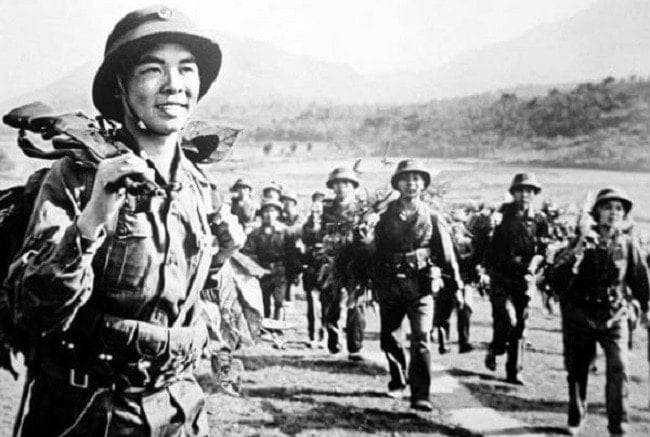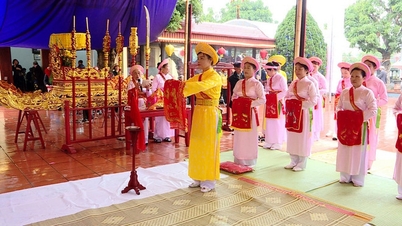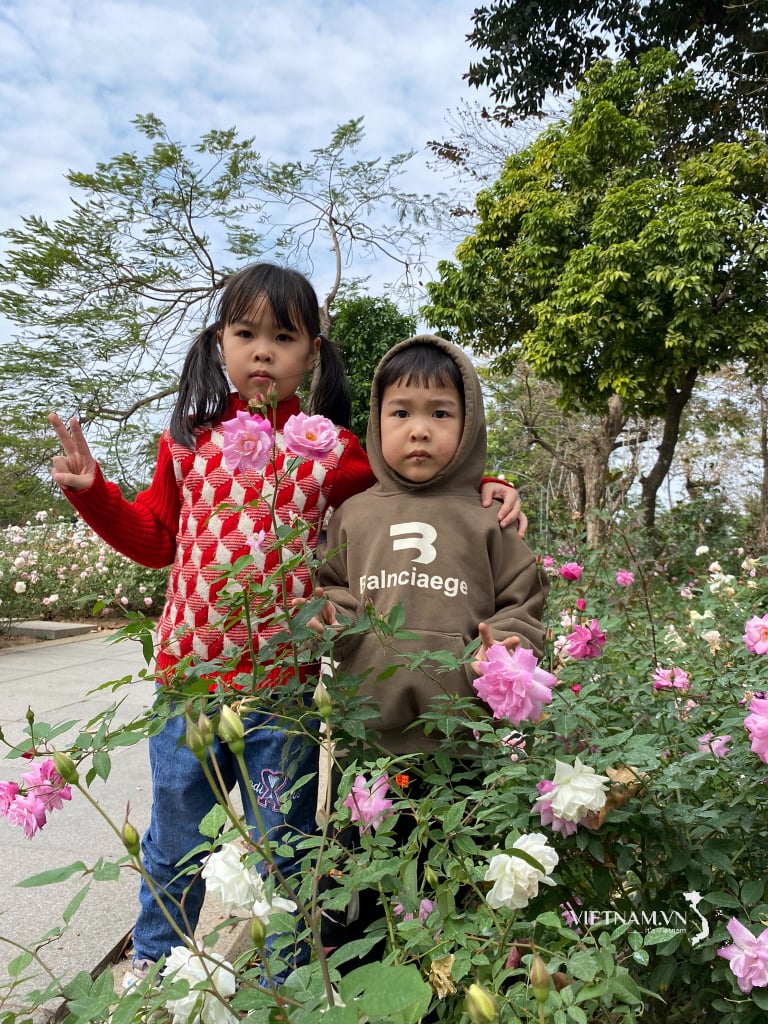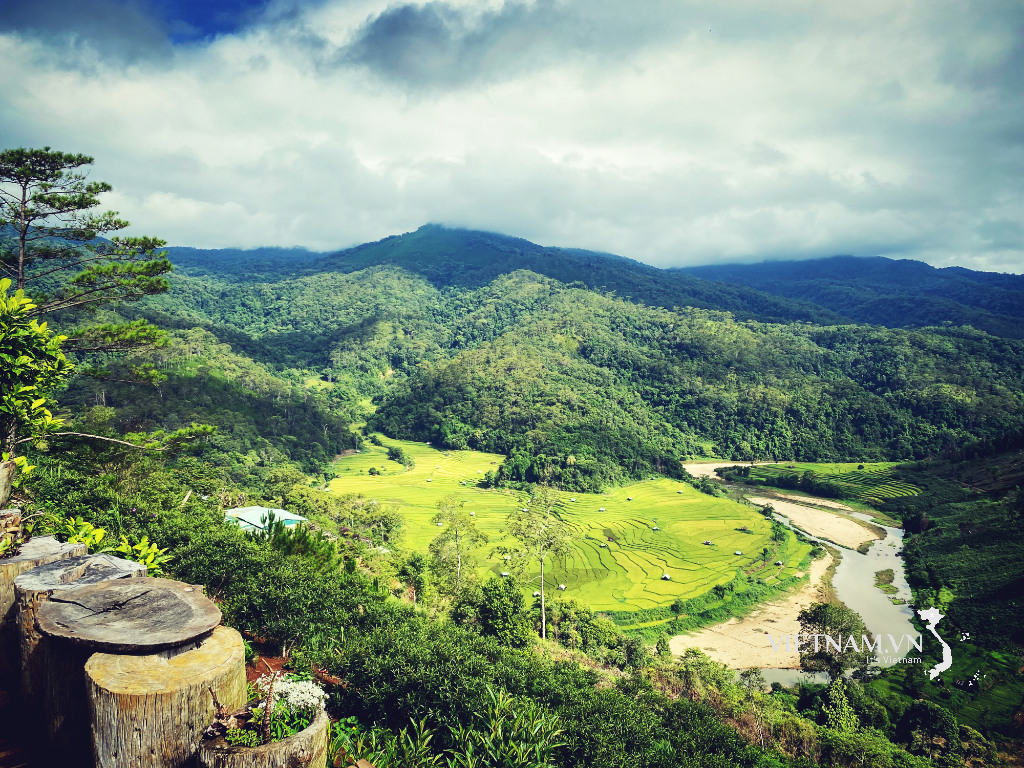 |
| "Uncle Ho's Soldiers" - a noble title, a source of pride for officers and soldiers of the Vietnam People's Army. Photo: Archival material. |
The National Guard in the resistance war, which was "all-people, comprehensive, protracted, self-reliant, and inevitably victorious," were peasants taking up arms. They were gentle, simple, rustic, uneducated, united under the banner of revolution, undergoing military training, and optimistically participating in the resistance: "We were a group of people from all over the country / We met before we knew how to read / We became acquainted from the very beginning / We were unfamiliar with shooting / We had only learned a few military lessons / But our hearts were still filled with joy in the resistance" (Remembering, Hong Nguyen).
They came from poor rural villages, met by chance, and became close friends and comrades: "Sharing a blanket in the dark night, they became close friends/Comrades!" (Comrades, Chinh Huu). The soldiers of the National Guard were also educated urban youths who were enlightened and self-motivated to take up arms to fight the enemy and save the country. They viewed sacrifice as a normal occurrence, taking pride in falling amidst the roaring farewell of the majestic Ma River: "His ceremonial robe replaced his burial shroud as he returned to the earth/ The Ma River roars a solitary farewell."
And so, they both hated the enemy from the bottom of their hearts and were very romantic when thinking about love and the meaning of life: "Eyes glaring, sending dreams across the border / Dreaming of Hanoi's beautiful women at night" (Tay Tien, Quang Dung). It is for this reason that the national defense soldier became a symbol of Ho Chi Minh's soldiers throughout the nine years of resistance. And it was they who created the Dien Bien Phu victory, "renowned throughout the world, shaking the earth," burying old colonialism and astonishing the whole world : "Nine years made Dien Bien Phu / A red wreath, a golden epic" (Thirty Years of Our Lives with the Party, To Huu).
Entering the resistance war against the US, the soldiers of Uncle Ho's army were affectionately called "Liberation Army soldiers" by the people of South Vietnam. This was a resistance war of new magnitude, between a small nation and a giant superpower. Therefore, the image of the Liberation Army soldier was seen as a symbol of a just war, even though they were just "barefoot boys," but their gentle, endearing floppy hats, which "didn't hurt a single leaf on a branch," were "stronger than all bombs and bullets / making even the Pentagon tremble" (Spring Song 68, by Tố Hữu).
The Liberation Army soldiers were a generation of Ho Chi Minh's soldiers following in the footsteps of the National Guard soldiers of the past, entering the resistance war with all the postures and thoughts unique to their generation: "walking the path that those before have walked / by many new paths" (A soldier speaks about his generation, Thanh Thao). They calmly "cut through the Truong Son Mountains to save the country": "The car has no windows not because the car doesn't have windows / Bombs shook, bombs rattled, the windows shattered / We calmly sit in the driver's cabin / Looking at the land, looking at the sky, looking straight ahead" (The Squad of Cars Without Windows, Pham Tien Duat).
Their sacrificial posture created the iconic image of the Liberation Army soldier etched into the century: "Leaving behind only the Vietnamese stance etched into the century / You are a Liberation Army soldier" (The Vietnamese Stance, Le Anh Xuan). From that stance, "The Fatherland soars into boundless springs" - the victorious Spring of 1975 ushered the country into a new era: peace and national unity.
Poems about Vietnamese volunteer soldiers in Cambodia also differ from those about the National Guard and Liberation Army before them, especially in the raw, informal way the lyrical self addresses each other with the intimate terms "I, you, us...": "Line up for me to call roll / Young soldiers from far away / Line up to hear me tell / Stories of fighting and stories of... falling in love" (Roll Call, Pham Sy Sau). Living and fighting outside the homeland, perhaps such forms of address fully capture the sincerity: "Tomorrow you'll go home with your lover in your arms / Please give me a soldier's kiss" (To friends who have completed their duty, Pham Sy Sau)...
When peace has returned, the soldier's duty is to both build and defend the Fatherland. At this time, the soldier returns to the common title "Uncle Ho's Soldier." Unlike young people in peacetime in general, soldiers in peacetime, in addition to their mission of guarding the land and sky, also worry about maintaining peace for the people in their daily lives. They are still the ones who endure the most hardships, especially when the country faces natural disasters or epidemics.
Even then, they still befriended hardship and made wind and rain their home: "Soldiers in peacetime / The country is free from enemy shadows / Thinking they are near, yet they are far / Hardship remains their friend / Wind and rain remains their home" (Song of Soldiers in Peacetime, Tran Dang Khoa). The hardships, including losses and sacrifices, of soldiers in peacetime clearly demonstrated their noble qualities, worthy of the title "Ho Chi Minh's Soldiers".
MAI BA AN
Source: https://baodanang.vn/channel/5433/202505/nguoi-linh-cu-ho-trong-tho-4006292/







































































































Comment (0)